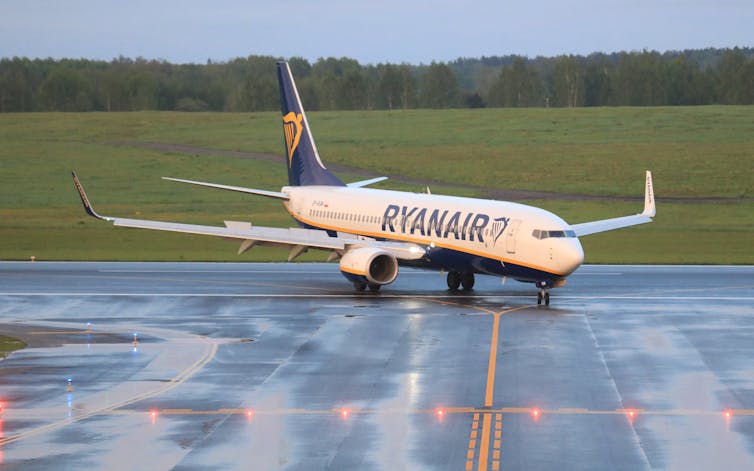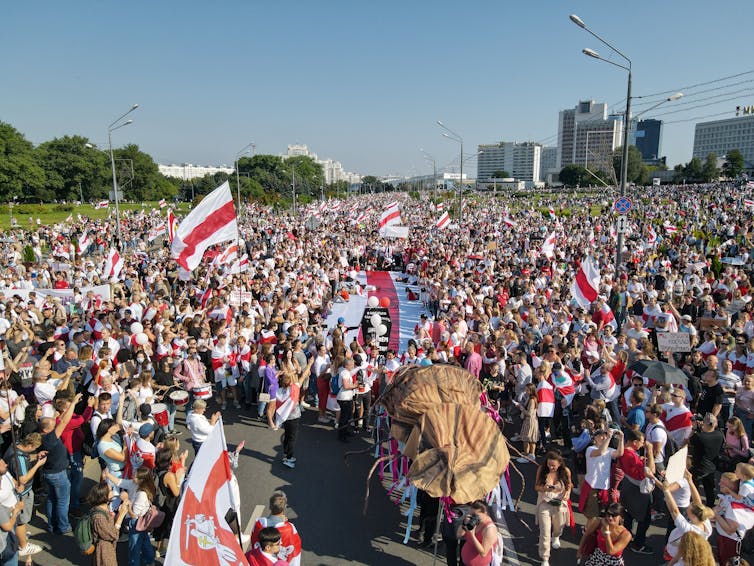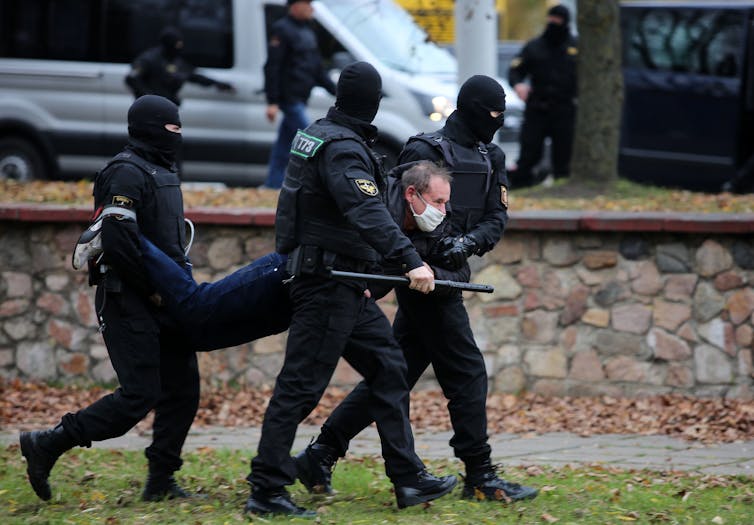Belarus plane hijacking snarls Biden's hopes to repair strained US-Russia relationship
- Written by Tatsiana Kulakevich, Lecturer at SIGS, Research Fellow, Affiliate Faculty at the Institute on Russia, University of South Florida
The extraordinary May 23 interception of a Ryanair flight carrying Belarusian opposition journalist Raman Pratasevich and 132 other passengers over Minsk, the capital of Belarus, came at an awkward time for the U.S. and Russia.
On June 16, Joe Biden and Russian leader Vladimir Putin are set to meet[1] for the first time since Biden took office. The Biden administration has signaled a desire to build a stable, predictable relationship[2] with Russia. Just recently, the White House waived sanctions against the Nord Stream 2[3] natural-gas pipeline from Russia to the European Union, allowing Russia to sell more gas to the EU.
Days later, Belarus’ authoritarian leader, Alexander Lukashenko, sent a MiG-29 fighter jet[4] to force the landing of the airplane flying between two NATO allies, which carried Raman Pratasevich as a passenger. The journalist was arrested by the Belarusian authorities upon landing.
The European Union reacted furiously, advising airlines to avoid Belarusian airspace[5], banning Belarusian airlines from Europe and agreeing to hit Belarus with new economic sanctions[6].
Putin is a strong ally of Lukashenko’s. Days after the plane incident, he hosted Lukashenko at the Russian resort city of Sochi, where they spent five hours talking and then left on a yacht trip[7] together on the Black Sea.
 This Ryanair passenger plane from Athens, Greece, was diverted to Minsk on May 23, 2021, after being told, falsely, there was a bomb on board.
Pettras Malukas/AFP via Getty Images[8]
This Ryanair passenger plane from Athens, Greece, was diverted to Minsk on May 23, 2021, after being told, falsely, there was a bomb on board.
Pettras Malukas/AFP via Getty Images[8]
At the upcoming summit in Geneva, Biden and Putin are expected to talk about a range of pressing issues[9], including Russia’s military buildup near Ukraine, arms control and the COVID-19 pandemic[10].
Now, Biden must also use his personal meeting with Putin to try to ratchet up pressure on Lukashenko, who has essentially closed Belarus’ borders to prevent citizens from leaving[11]. Russia is critical to holding Lukashenko accountable[12] – but Putin is unlikely to endorse any effort to do so.
The Russia-Belarus relationship
Lukashenko was already on the outs with Europe and the United States after rigging a presidential election last August[13] and brutally suppressing citizens who protested his fraudulent win. Pratasevich covered the uprising as editor-in-chief of the Telegram Nexta Live channel, which has 1.4 million subscribers.
An array of international sanctions followed Lukashenko’s August 2020 crackdown. But Moscow provided a crucial lifeline. In addition to recognizing Lukashenko as Belarus’ legitimate president – unlike at least 33 countries worldwide – Putin also promised to protect Belarus[14] and warned foreign powers not to interfere in Belarus’ affairs.
That allowed Lukashenko to demonstrate to regime insiders and security forces that he could sustain his 26-year-long grip on power.
 Tens of thousands of Belarusians joined protest against Lukashenko’s disputed reelection in August 2020, when election results showed this longtime dictator winning by more than 80%.
Getty Images[15]
Tens of thousands of Belarusians joined protest against Lukashenko’s disputed reelection in August 2020, when election results showed this longtime dictator winning by more than 80%.
Getty Images[15]
Putin’s support has not wavered with the plane hijacking. After the summit between Putin and Lukashenko in Sochi on May 29 and May 30, Russia announced that it would soon release a delayed $500 million credit to Belarus[16]. It also agreed to increase flights between Belarus and Russia.
US and Russia at odds
Meanwhile, Russia-U.S. relations are badly strained.
First there was Russia’s 2014 annexation of Ukraine’s Crimean peninsula[17]. Then, there was Russia’s interference in the 2016 U.S. presidential vote and other elections, and its apparent involvement in the 2020 SolarWinds hacking attacks[18] that breached the data of multiple U.S. federal agencies and thousands of organizations globally.
In April, Biden imposed sanctions against the Kremlin[19] for these acts.
The 2020 poisoning of Russian opposition leader Alexei Navalny, apparently by agents of the Russian government, and his subsequent jailing has only increased tensions.
When asked if Putin is “a killer[20]” during an interview in March, Biden said yes.
This troubled history explains why both the U.S. and Russia are setting low expectations[21] for the upcoming U.S.-Russia summit.
Putin’s press secretary, Dmitry Peskov, said the two leaders will exchange views but are unlikely to “come to an understanding”[22] on most issues. The Biden administration says it simply hopes the summit will “normalize ties[23]” between the two countries.
US to punish Belarus
In a May 31 interview[24], the U.S. ambassador to Belarus, Julie Fisher, said the U.S. would “work in unison with our European partners in order to come up with appropriate responses” to Lukashenko’s plane hijacking.
“West must respond in terms that Lukashenko is able to understand,” she said.
 Police arresting a protester at an anti-government march last year.
Stringer/AFP via Getty Images[25]
Police arresting a protester at an anti-government march last year.
Stringer/AFP via Getty Images[25]
The U.S. plans to reimpose full sanctions[26] on June 3 prohibiting U.S. people and businesses from conducting financial transactions with nine state-owned enterprises in Belarus. The U.S. also intends to cease allowing Belarusian air carriers to enter its airspace.
Biden’s office is reportedly preparing an executive order[27] allowing him to impose additional punishments on Lukashenko.
And before meeting with Putin, Biden will attend the Group of Seven (G-7) summit[28] in England. Belarus’ dangerous behavior[29] is on the group’s agenda.
Raising the cost of repression
Belarus will most likely be targeted with new sanctions through a combined effort by the EU and the U.S. to help hold the Lukashenko regime to account for its bad behavior.
Sanctions alone, however, will not stop Lukashenko.
[Over 100,000 readers rely on The Conversation’s newsletter to understand the world. Sign up today[30].]
As long as he maintains Russian backing, the West’s power to curb him is limited. Measures to increase the cost for Russia to keep supporting the Belarusian regime may be necessary to limit Lukashenko’s apparent sense of impunity.
But the Belarusian people will benefit if Biden and the EU stand united against a rogue state on Europe’s eastern border. Its authoritarian leader terrorizes his own people – and, as the Ryanair incident demonstrated, the international community – with Russia as a willing enabler.
References
- ^ set to meet (apnews.com)
- ^ stable, predictable relationship (www.google.com)
- ^ waived sanctions against the Nord Stream 2 (www.reuters.com)
- ^ a MiG-29 fighter jet (www.usatoday.com)
- ^ avoid Belarusian airspace (www.wsj.com)
- ^ new economic sanctions (www.reuters.com)
- ^ yacht trip (www.rferl.org)
- ^ Pettras Malukas/AFP via Getty Images (media.gettyimages.com)
- ^ range of pressing issues (www.whitehouse.gov)
- ^ the COVID-19 pandemic (www.cnn.com)
- ^ has essentially closed Belarus’ borders to prevent citizens from leaving (www.businessinsider.com)
- ^ to holding Lukashenko accountable (www.cnbc.com)
- ^ rigging a presidential election last August (theconversation.com)
- ^ promised to protect Belarus (www.euractiv.com)
- ^ Getty Images (media.gettyimages.com)
- ^ $500 million credit to Belarus (www.ft.com)
- ^ 2014 annexation of Ukraine’s Crimean peninsula (www.theguardian.com)
- ^ SolarWinds hacking attacks (www.cnbc.com)
- ^ sanctions against the Kremlin (www.skadden.com)
- ^ a killer (www.cnn.com)
- ^ low expectations (www.newsweek.com)
- ^ unlikely to “come to an understanding” (www.rbc.ru)
- ^ normalize ties (www.usnews.com)
- ^ May 31 interview (belsat.eu)
- ^ Stringer/AFP via Getty Images (media.gettyimages.com)
- ^ reimpose full sanctions (www.whitehouse.gov)
- ^ executive order (www.whitehouse.gov)
- ^ Group of Seven (G-7) summit (cafod.org.uk)
- ^ Belarus’ dangerous behavior (news.trust.org)
- ^ Sign up today (theconversation.com)
Authors: Tatsiana Kulakevich, Lecturer at SIGS, Research Fellow, Affiliate Faculty at the Institute on Russia, University of South Florida

